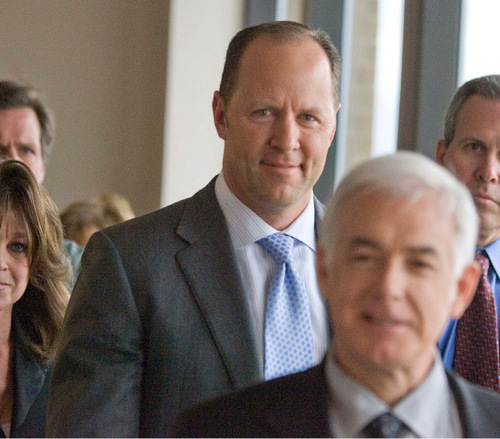This is an archived article that was published on sltrib.com in 2010, and information in the article may be outdated. It is provided only for personal research purposes and may not be reprinted.
A judge refused to throw out the traffic stop that led to former Senate Majority Leader Sheldon Killpack's drunk driving arrest, dealing a serious blow to Killpack's defense as the case heads to trial in November.
Killpack's attorney, Ed Brass, had argued that the Utah Highway Patrol trooper who stopped Killpack on Jan. 15 had no reason to pull over his client, because he had not broken any traffic laws.
If Brass had succeeded, the drunk driving charge would have had to have been dismissed, the prosecutor said.
"There is no traffic violation that occurred," Brass said. "You can't see a violation that takes place on the [trooper's dash-cam] video … unless being in the vicinity of an establishment where drinks are served late at night is reasonable suspicion."
"This is what the 4th Amendment is all about," Brass said, "to protect the rest of us from unjustified, unwarranted stops late at night."
But Salt Lake County prosecutor Thomas Lopresto argued the tire on Killpack's Toyota Tundra pickup hit the center lane dividing line three times and that was enough justification for the trooper to make the stop since state law requires drivers to stay "entirely within a single lane."
While Brass argued the line was neutral turf between the two lanes of travel, Lopresto argued that if both cars were allowed to travel on or near the line they would collide.
"The only common sense understanding is that driving on top of the lane line is not entirely within a single lane," Lopresto said.
Judge Shauna Graves-Robertson agreed that the trooper had a reasonable basis to stop Killpack's truck.
"Ultimately, I have to ask myself: 'Is it reasonable?'" Graves-Robertson said. "I think it was reasonable. I believe the fact the defendant was traveling on the line, it's reasonable [to stop him] and I'm going to deny the motion [to suppress the stop]."
Graves-Robertson scheduled the case for trial on Nov. 10.
Brass said he was disappointed with the decision, but he had not discussed the matter with Killpack to decide what the next step would be.
Killpack was pulled over just after midnight as he left the bar Liquid Joe's where he and several others had been watching the rock cover band Metal Gods. He told a trooper he had not been drinking, but performed poorly on field sobriety tests and refused to take a breath test.
Blood tests showed his blood-alcohol level was 0.11, above the legal limit of 0.08. He resigned his post as majority leader the day after his arrest.
Killpack has also appealed an 18-month suspension of his license, which is automatic under state law if a driver refuses a breath test. Two weeks ago, Brass sent an e-mail to the attorney general's office saying that Killpack thought Attorney General Mark Shurtleff might be able to get the suspension reduced. Brass said that was his own doing and that Killpack was not seeking any political favors, although Shurtleff has said that was how he interpreted the request.



